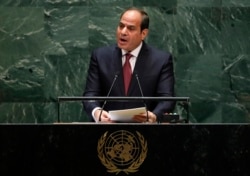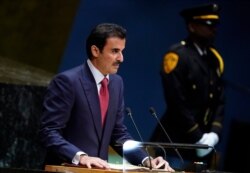Egypt and Qatar, who support rival groups in the Libyan conflict, traded barbs Tuesday at the United Nations, highlighting just how difficult it will be for the U.N. to push renewed peace efforts.
Libya's conflict has increasingly become a proxy war between foreign powers, which have been backing various armed groups since the 2011 uprising against Moammar Gadhafi. The former rebels have been fighting each other since then.
Egypt, along with the United Arab Emirates, is a supporter of Libyan eastern commander Khalifa Haftar, whose Libya National Army (LNA) has been trying to take Tripoli from forces allied with the internationally recognized government (GNA). Turkey and Qatar both back the GNA.
Egypt's comments
Without naming countries specifically, Egyptian President Abdel Fattah el-Sisi told delegates at the U.N. General Assembly that there had to be a concerted effort to stop militias taking control of Libya and preventing support form external actors.
"We need to work on unifying all national institutions in order to save our dear neighbor from the ensuing chaos by militias and prevent the intervention of external actors in Libya's internal affairs," Sisi said in a speech.
Haftar's forces started a campaign in April with a ground offensive supported by airstrikes and his backers have repeatedly labeled militias in Tripoli as terrorist groups.
The campaign has displaced more than 120,000 people in Tripoli alone, killed hundreds of civilians, and risks disrupting oil supplies from Libya.
"This conflict needs to be stopped. It is time to take a bold and decisive stand to address the root causes of the Libyan crisis comprehensively and can be achieved by fully committing to the United Nations plan," Sisi said.
Qatar's response
But addressing the same delegates shortly after, Qatar's Emir, Sheikh Tamim bin Hamad al-Thani, accused Haftar's forces of carrying out war crimes with impunity and with the support of countries that were undermining the GNA and U.N. peace efforts.
"The latest military operations on the capital Tripoli have thwarted the holding of the comprehensive Libyan national conference," al-Thani said.
"There is an internationally recognized settlement, but certain countries say they formally participate in international efforts on one hand and then undermine these efforts on another hand by supporting warlords and terrorist militias for their narrow interests against the legitimate government," he said.
International conference
Doha and Cairo's differences were being openly voiced weeks after U.N. Libya envoy Ghassan Salame unveiled plans for an international conference to bring together foreign powers backing rival groups on the ground, without naming a venue.
Germany emerged as a possible location with Berlin trying to put it together by October.
Salame believes Germany can mediate because it is seen as impartial in the conflict in contrast to France and Italy, which have been competing for influence.
France and Italy have oil and gas interests in Libya and have been accused of also backing protagonists in the conflict.
Both countries brought Haftar and GNA Prime Minister Fayez al-Serraj, along with regional players, together in Paris and Palermo last year, but failed to achieve a breakthrough.
The two will host a ministerial meeting of countries involved in the Libyan conflict at the U.N. on Thursday, with the aim to bridge differences between all sides.
"There will no military solution in Libya. Those who believe it are wrong and risk dragging the country into a dramatic turn," French Foreign Minister Jean-Yves Le Drian told reporters.







